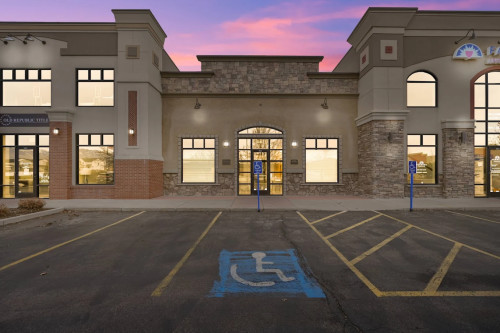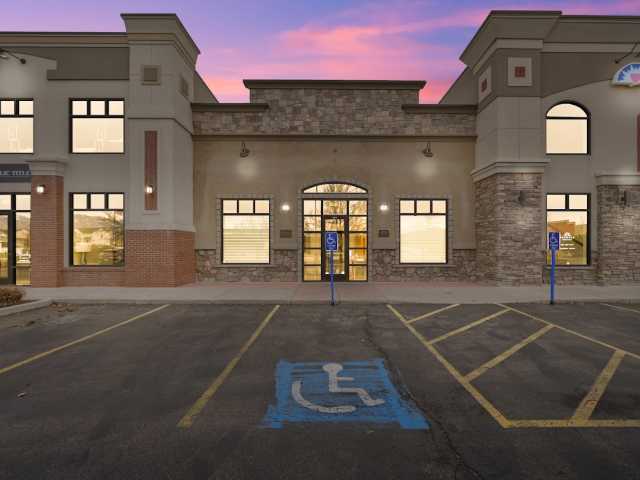








Corner Canyon Health Centers - Outpatient
Verified Center
This provider's information has been quality-checked by Recovery.com's Research Team for accuracy and completeness, including center verification through appropriate third-party organizations.
Treatment Focus
This center treats substance use disorders and mental health conditions. You'll receive individualized care catered to your unique situation and diagnosis, learn practical skills for recovery, and make new connections in a restorative environment.
Primary Level of Care
Outpatient treatment offers flexible therapeutic and medical care without the need to stay overnight in a hospital or inpatient facility. Some centers off intensive outpatient program (IOP), which falls between inpatient care and traditional outpatient service.
Treatment Focus
This center treats substance use disorders and mental health conditions. You'll receive individualized care catered to your unique situation and diagnosis, learn practical skills for recovery, and make new connections in a restorative environment.
Primary Level of Care
Outpatient treatment offers flexible therapeutic and medical care without the need to stay overnight in a hospital or inpatient facility. Some centers off intensive outpatient program (IOP), which falls between inpatient care and traditional outpatient service.
Insurance Accepted
This center accepts insurance, exact cost can vary depending on your plan and deductible.
Corner Canyon Health Centers - Outpatient
Corner Canyon Health Centers - Outpatient
About Corner Canyon Health Centers - Outpatient
Corner Canyon Health Centers Outpatient is a place where people who are hurting can find deep help. They treat a range of mental health struggles: everything from anxiety, depression, PTSD, mood disorders, OCD, to personality challenges and neurodivergent needs. They also help those with co-occurring issues like addictions. They offer partial hospitalization (PHP), intensive outpatient (IOP), transitional living, and outpatient services—so everyone can find a level of care that works for them.
Find Balance through Science and Soulful Therapies
Instead of offering a generic program, their team begins with a deep assessment—looking at everything from medical history and mental health to nutrition and even genetics. This allows them to create a plan that’s unique to each client. Once results are in, they blend science-backed therapies like eye movement therapy (EMDR) and dialectical behavior therapy (DBT) with practices like nutritional psychiatry, somatic work, and nature or animal-based therapy. The result is care that feels personal, supportive, and designed to help healing last long after treatment ends.
Embrace Therapy in a Warm, Welcoming Space
Corner Canyon’s outpatient clinic’s rooms are bright, open, and spacious with plenty of areas for one-on-one sessions or group therapy. The cozy decor and mountain views remind clients that their healing work doesn’t have to be cold or clinical. Clients can show up as they are, and feel confident that every detail is set up to support their growth and peace of mind.
Walk Out Feeling Prepared and Empowered
Discharge marks the beginning of a new chapter, one where clients carry forward all the tools they’ve learned. Their therapists and care teams stay in touch, guiding clients through re-engagement with family, a return to work, or simply navigating their moods.
Highlights from the Center
Highlights
These highlights are provided by and paid for by the center.
Customized Treatment Plans
Holistic Approach
Wellness Emphasis
Trauma Treatment
Center Overview
Treatment Focus
This center treats substance use disorders and mental health conditions. You'll receive individualized care catered to your unique situation and diagnosis, learn practical skills for recovery, and make new connections in a restorative environment.

Corner Canyon Health Centers - Outpatient
Insurance Accepted
Cash Pay Rates
Estimated Cash Pay Rate
Center pricing can vary based on program and length of stay. Contact the center for more information. Recovery.com strives for price transparency so you can make an informed decision.




Corner Canyon Residential Facility
Recovery.com Verified Listing
Recovery.com verified that the name, location, contact information and license to operate for this treatment provider are valid and up-to-date.

Joint Commission Accredited

Licensed by Utah
Recovery.com is an independent, third-party mental health resource. Verification does not imply endorsement and does not guarantee the quality of treatment services.
Meet Your Care Team

Cheryl Kehl
Founder and CEO
LCSW

Daniel Nuno
COO

Dana Goodrich
Executive Director

Brad Christensen
Chief People Officer

Sara Sorenson
Director of Clinical Development
LCMHC

Eric Johansen
Director of Clinical Operations
LCSW

Stephanie M. King
Family Nurse Practitioner
FNP-C, APRN, DC

Christopher Black
Ketamine Provider
RN, BSN, PMHNP-BC

Austin Florez
Therapist
ACMHC

Kiera Kuck
Therapist
AMFT

Milene Francis
Therapist
MSW

Alex Jacobson
Therapist
Your Care Options
Specializations
Day Treatment
In a PHP, patients live at home but follow an intensive schedule of treatment. Most programs require you to be on-site for about 40 hours per week.
Anxiety
Anxiety is a common mental health condition that can include excessive worry, panic attacks, physical tension, and increased blood pressure.
Depression
Symptoms of depression may include fatigue, a sense of numbness, and loss of interest in activities. This condition can range from mild to severe.
Outpatient
During outpatient rehab, patients attend a structured treatment program while continuing to live at home.
Post Traumatic Stress Disorder
PTSD is a long-term mental health issue caused by a disturbing event or events. Symptoms include anxiety, dissociation, flashbacks, and intrusive thoughts.
Who We Treat
Men and Women
Men and women attend treatment for addiction in a co-ed setting, going to therapy groups together to share experiences, struggles, and successes.
Treatment Services
Day Treatment
In a PHP, patients live at home but follow an intensive schedule of treatment. Most programs require you to be on-site for about 40 hours per week.
Intensive Outpatient Program
In an IOP, patients live at home or a sober living, but attend treatment typically 9-15 hours a week. Most programs include talk therapy, support groups, and other methods.
Licensed Primary Mental Health
Some primary care providers offer mental health diagnosis and treatment. This can prevent patients from developing more serious conditions.
Outpatient
During outpatient rehab, patients attend a structured treatment program while continuing to live at home.
Transitional Living
After rehab, some people stay in a transitional living situation before returning home. These programs offer structure, education, and community support.
Approaches
Evidence-Based
A combination of scientifically rooted therapies and treatments make up evidence-based care, defined by their measured and proven results.
Individual Treatment
Individual care meets the needs of each patient, using personalized treatment to provide them the most relevant care and greatest chance of success.
Therapies
1-on-1 Counseling
Patient and therapist meet 1-on-1 to work through difficult emotions and behavioral challenges in a personal, private setting.
Online Therapy
Patients can connect with a therapist via videochat, messaging, email, or phone. Remote therapy makes treatment more accessible.
Eye Movement Therapy (EMDR)
Lateral, guided eye movements help reduce the emotional reactions of retelling and reprocessing trauma, allowing intense feelings to dissipate.
Family Therapy
Family therapy addresses group dynamics within a family system, with a focus on improving communication and interrupting unhealthy relationship patterns.
Medication-Assisted Treatment
Combined with behavioral therapy, prescribed medications can enhance treatment by relieving withdrawal symptoms and focus patients on their recovery.
Nutrition Counseling
Nutritious food helps patients heal from within, setting them up for mental and bodily wellness as they learn about healthy eating.
Conditions We Treat
Anxiety
Anxiety is a common mental health condition that can include excessive worry, panic attacks, physical tension, and increased blood pressure.
Depression
Symptoms of depression may include fatigue, a sense of numbness, and loss of interest in activities. This condition can range from mild to severe.
Post Traumatic Stress Disorder
PTSD is a long-term mental health issue caused by a disturbing event or events. Symptoms include anxiety, dissociation, flashbacks, and intrusive thoughts.
Trauma
Some traumatic events are so disturbing that they cause long-term mental health problems. Those ongoing issues can also be referred to as "trauma."
Substances We Treat
Alcohol
Using alcohol as a coping mechanism, or drinking excessively throughout the week, signals an alcohol use disorder.
Benzodiazepines
Benzodiazepines are prescribed to treat anxiety and sleep issues. They are highly habit forming, and their abuse can cause mood changes and poor judgement.
Co-Occurring Disorders
A person with multiple mental health diagnoses, such as addiction and depression, has co-occurring disorders also called dual diagnosis.
Cocaine
Cocaine is a stimulant with euphoric effects. Agitation, muscle ticks, psychosis, and heart issues are common symptoms of cocaine abuse.
Drug Addiction
Drug addiction is the excessive and repetitive use of substances, despite harmful consequences to a person's life, health, and relationships.
Heroin
Heroin is a highly addictive and illegal opioid. It can cause insomnia, collapsed veins, heart issues, and additional mental health issues.
Methamphetamine
Methamphetamine, or meth, increases energy, agitation, and paranoia. Long-term use can result in severe physical and mental health issues.
Opioids
Opioids produce pain-relief and euphoria, which can lead to addiction. This class of drugs includes prescribed medication and the illegal drug heroin.
Languages
Aftercare
Care Designed for Your Needs
Amenities
Activities
Yoga
Yoga is both a physical and spiritual practice. It includes a flow of movement, breathing techniques, and meditation.
Smoking and Vaping Policy
Learn More About the Center
How to Tell if Someone is a Narcissist
Discover how someone’s behavior may reveal subtle signs and hidden types of narcissism that change the way others see them.
How to Get Out of Freeze Response
Learn why the body freezes under anxiety—and discover proven steps to go from shutdown to strength.
Link between Lifestyle and Mental Health
Uncover how simple tweaks to exercise, diet, and sleep could dramatically shift mood, anxiety, and overall well-being.
What is Epigenetics?
Discover how life experiences can rewrite gene expression.





